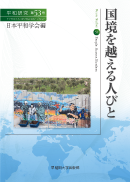53 巻
選択された号の論文の15件中1~15を表示しています
- |<
- <
- 1
- >
- >|
巻頭言
-
2020 年 53 巻 p. i-xv
発行日: 2020年
公開日: 2023/11/24
PDF形式でダウンロード (530K)
依頼論文
-
2020 年 53 巻 p. 1-16
発行日: 2020年
公開日: 2023/11/24
PDF形式でダウンロード (501K) -
2020 年 53 巻 p. 17-33
発行日: 2020年
公開日: 2023/11/24
PDF形式でダウンロード (461K) -
2020 年 53 巻 p. 35-50
発行日: 2020年
公開日: 2023/11/24
PDF形式でダウンロード (808K)
投稿論文
-
2020 年 53 巻 p. 51-70
発行日: 2020年
公開日: 2023/11/24
PDF形式でダウンロード (553K) -
2020 年 53 巻 p. 71-88
発行日: 2020年
公開日: 2023/11/24
PDF形式でダウンロード (533K) -
2020 年 53 巻 p. 89-108
発行日: 2020年
公開日: 2023/11/24
PDF形式でダウンロード (2422K)
書評
-
2020 年 53 巻 p. 109-114
発行日: 2020年
公開日: 2023/11/24
PDF形式でダウンロード (258K)
SUMMARY
-
2020 年 53 巻 p. 122
発行日: 2020年
公開日: 2023/11/24
PDF形式でダウンロード (95K) -
2020 年 53 巻 p. 123
発行日: 2020年
公開日: 2023/11/24
PDF形式でダウンロード (96K) -
2020 年 53 巻 p. 124
発行日: 2020年
公開日: 2023/11/24
PDF形式でダウンロード (92K) -
2020 年 53 巻 p. 125
発行日: 2020年
公開日: 2023/11/24
PDF形式でダウンロード (96K) -
2020 年 53 巻 p. 126
発行日: 2020年
公開日: 2023/11/24
PDF形式でダウンロード (96K) -
2020 年 53 巻 p. 127
発行日: 2020年
公開日: 2023/11/24
PDF形式でダウンロード (92K)
編集後記
-
2020 年 53 巻 p. 128-129
発行日: 2020年
公開日: 2023/11/24
PDF形式でダウンロード (217K)
- |<
- <
- 1
- >
- >|
